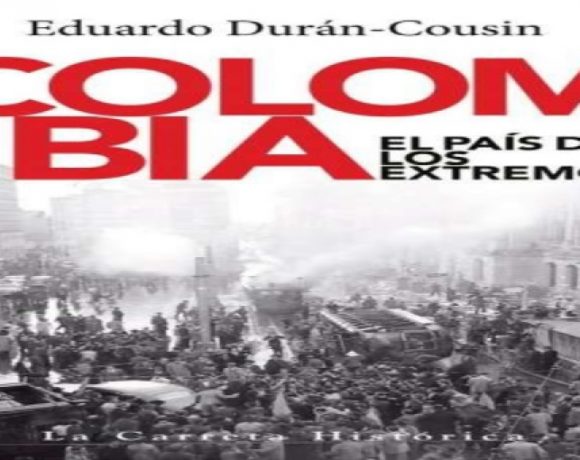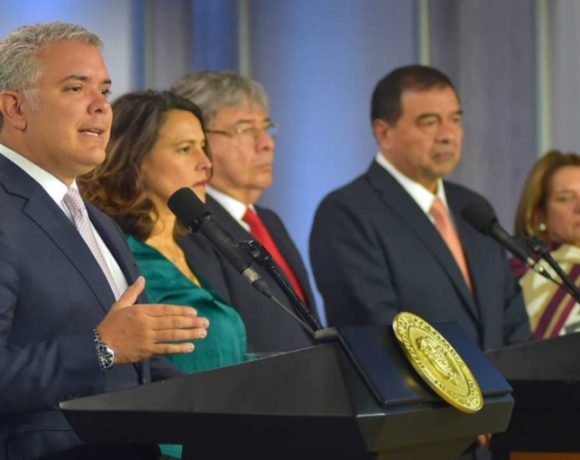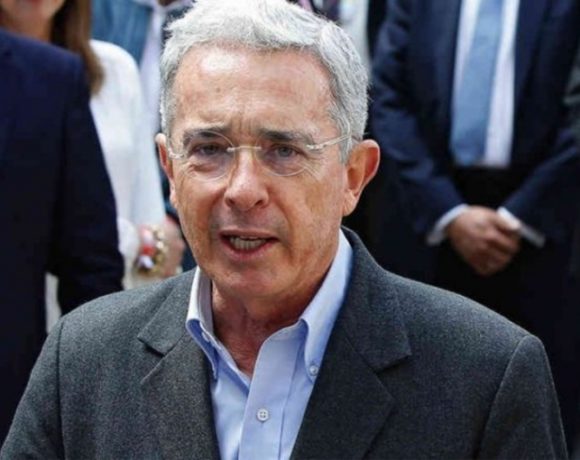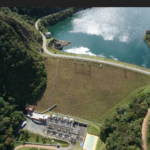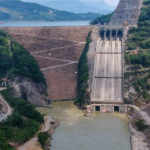Court Orders Freeing of Colombian Ex-President Alvaro Uribe
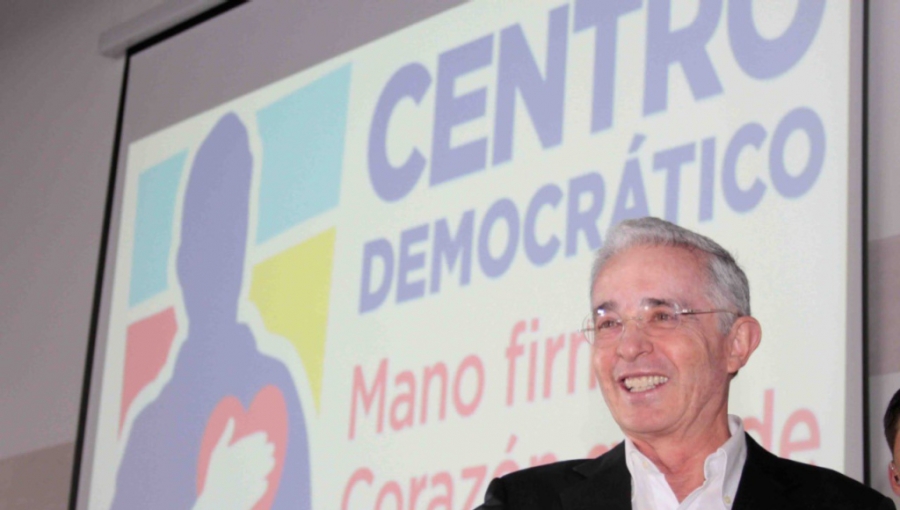
A Bogota District Court – having been assigned a case involving witness-tampering allegations earlier brought before an investigative unit of Colombia’s Supreme Court (“Sala de Instruccion”) – this morning (October 10) ordered the release from house arrest of former Colombia President (and former Senator) Alvaro Uribe.
District Court Judge Clara Ximena Salcedo found that under Colombia’s Constitution, it’s illegal to detain anyone that hasn’t been charged with a crime.
It’s now up to Colombia’s Attorney General to decide whether and with what evidence former President Uribe should be charged and tried on allegations originating from left-wing Senator Ivan Cepeda claiming that Uribe and one of his lawyers were involved in a witness-tampering scheme.
Understanding the Background
Senator Cepeda – who has dedicated his entire career to a vendetta against President Uribe — continues to claim that his late father Manuel Cepeda was actually a victim of a plot by the Colombian government — and by inference, supposedly Uribe can be seen tangentially for blame.
Manuel Cepeda — a member of the Central Committee of the Colombian Communist Party — was murdered in 1994 by former “AUC” paramilitary leader Carlos Castaño in an act of revenge for an earlier murder of an AUC member by the narco-communist FARC army. The FARC at the time was in political alliance with the Colombian Communist Party — and the current FARC members in Congress (all former FARC guerrilla leaders) are very friendly with Cepeda’s son, Ivan.
In Ivan Cepeda’s way of thinking, former President Alvaro Uribe can be seen as the ultimate source of the rise of Colombian paramilitaries — including those involved in his father’s murder — even though Uribe didn’t become Colombian President until eight years after his father’s murder, and Ivan Cepeda has never accused Uribe of actual involvement in the murder.
Ironically, it was former President Cesar Gaviria – not former President Uribe – who legally founded the “Convivir” rural paramilitary movement (later succeeded by the AUC). “Convivir” at first was dedicated exclusively to fighting the FARC terrorists but eventually – mainly due to a lack of government funding — degenerated into yet another narco-terrorist group, fighting against its rival FARC.
In Colombia’s never-ending political cannibalism, Uribe had earlier publicly charged that Senator Cepeda illegally tried to get jailed paramilitary criminals – including several jailed and/or extradited to the U.S. by Uribe – to take revenge against Uribe with trumped-up charges of involvement in alleged paramilitary murders of supposedly innocent civilians decades ago.
When a Colombian court dismissed Uribe’s allegations of Cepeda’s witness tampering, the court instead took-up Cepeda’s counter-charges, claiming Uribe and one of his lawyers illegally tampered with those same criminal witnesses.
To better understand the reasons behind Senator Cepeda’s vendetta against Uribe – a vendetta not coincidentally shared by Uribe rival, former President Manuel Santos and several of President Santos’ financially corrupted appointees to Colombia’s Supreme Court – it’s useful to examine a January 13, 2015 investigative report by astute Colombian political blog, Trinchera Politica.
We reproduce below (in full) an English translation of the Trinchera Politica report here:
Iván Cepeda: Revenge of the Heir to the 42nd Front of the FARC
Author: Trinchera Politica (blog)
13 January 2015
Manuel Cepeda Vargas [Senator Ivan Cepeda’s father] was a leftist ideologue, perhaps the one who best applied the concept of the [late Soviet Union Communist dictator Vladimir Lenin’s] ‘combination of all forms of struggle’ to achieve power.
Not in vain, [Manuel Cepeda’s] comrade Álvaro Delgado describes in his book, All Past Times Were Worse: “Like an unscrupulous man who fell in love with the [FARC] monster that he created together with the Communist Party, Manuel Cepeda Vargas helped the FARC to cleanse the Communist Party of all those [idealistic militants] who got tired of the massacres and violence that the FARC carried out.”
For his part, Steven Dudley, in his book Armas y Urnas [Weapons and Ballot-Boxes] with a single sentence shows how monstrous Cepeda Vargas became: “Manuel Cepeda was an ‘orthodox’ communist who first marginalized the democratic socialists (…) who defended the ‘combination of all forms of struggle.’ Using both legal and illegal means to take power was Manuel’s creed and, as a member of the Communist Party, he had among his responsibilities to maintain contact with the FARC (…) [but] his indiscretions cost him his life.”
Thanks to their tenacity in defending the armed struggle regardless of the methods, the FARC christened their most bloodthirsty Front with the name, ‘Manuel Cepeda Vargas.’
It is not in vain that the FARC Front that bears his name did not mind destroying an entire town in order to assassinate a few soldiers. You just have to see how Manuel Cepeda’s friend Álvaro Delgado, a fellow member of the Communist Party, describes [Manuel Cepeda], and how he is shown in the book, Weapons and Ballot-Boxes, in which they unmask a man who [possibly unwittingly] helped annihilate his own political party [including the Union Patriotica (UP) coalition] to justify the armed struggle. For a sinister character like this, the popular adage that says ‘the end justifies the means’ fits very well.
The FARC learned very well from their teacher and as the book Armas y Urnas shows, the FARC, by order of Jacobo Arenas, undertook [murders] against the [Communist-Party-led coalition] Union Patriotico (UP) in order to justify their armed struggle by murdering hundreds of them. It is for this reason that it is unconvincing that both the Union Patriotico and Manuel Cepeda supposedly died at the hands of [Colombian government] state organizations, because in principle it was the same FARC who persecuted those who demobilized, as they do today by assassinating deserters through their courts-martial.
Manuel Cepeda was assassinated in Bogotá on August 9, 1994, and the Colombian state, in the absence of a legal defense policy, was condemned by the Inter-American Court of Human Rights for his murder and [the government] was ordered to write a [sanitized] biography about his life, showing him as an integral man, to cleanse the memory of a being that really, if his life was as his comrades in the struggle paint it, did a lot of damage to our country and rivers of blood that have flowed in his name.
However, this chapter would not end here, as [former AUC leader] Carlos Castaño Gil himself admitted in his book, My Confession, on page 213. Castaño confesses to having directed and ordered the AUC Command to end the life of the then-Senator Manuel Cepeda, in retaliation for a murder [against an AUC member] ordered by the FARC. For Castaño Gil, the death of Manuel Cepeda [supposedly] would be a blow that would hurt the FARC.
But the Colombian Supreme Court declared the evidence [of Carlos Castaño’s confession] was illegal, as it was not provided in due time for the [trial] process, thus leaving the belief that state agents were the ones who murdered [Manuel Cepeda]. But Carlos Castaño’s testimony is corroborated by his brother-in-law Jesús Emiro Pereira, a confidant of the head of the AUC, who assured that he himself accompanied the command that would take Cepeda’s life.
Iván Cepeda Castro’s Emergence
In turn, Manuel Cepeda’s son — now Senator Iván Cepeda Castro, who has always been a member of left-wing parties and who even lived in Communist Cuba during his childhood, was later elected Senator for the Polo Democratico party.
Senator Ivan Cepeda has waged his most stubborn struggle to try to prove that his father was not killed by Carlos Castaño, but rather by the Colombian state and thus clear the name of his late father. Even though Carlos Castaño confessed to having ended the life of the late UP Senator [that is, Manuel Cepeda], Senator Ivan Cepeda Castro has tried by all possible means to have the death of his father be recognized as a crime of the state.
Now Senator Iván Cepeda Castro — as founder of the “Manuel Cepeda Vargas Foundation” and from his jurisdiction as defender of the human rights of state victims — has proposed to tell the story of the [Colombian guerrilla] conflict through organizations such as Memoria Historica, which is presided over by the confessed former ELN guerrilla member Leon Valencia.
If Iván Cepeda has tried to distort the story of his father’s death, then how can we expect the story of the conflict to be told? Perhaps in the same way in which he tries to hide that the death of his father was executed by Carlos Castaño.
Iván Cepeda is also a recognized detractor of the Colombian military forces. We must remember episodes and verbal confrontations such as the one he had with retired General Jaime Ruiz who made mention of the son of a late guerrilla leader who always opposed military-court jurisdiction [over alleged crimes by members of the military].
It is reality that Senator Ivan Cepeda at the beginning of 2013 demanded the end of military jurisdiction [courts] and finally the Constitutional Court declared them unenforceable.
It is really a shame that Colombia is one of the few countries in which the military is judged by the ordinary [civilian] justice system, which knows nothing about issues, procedures and actions within an armed conflict.
But at the same time that Cepeda asks the military to pay [in civil court] for their blunders in the conflict, he asks forgiveness for the FARC for their forced disappearances, laying anti-personnel mines, recruiting boys and girls for war where they were raped and many girls later forced to abort, for attacks on the civilian population, for kidnapping and extorting. Instead, they [FARC terrorists] are sentenced to seats in Congress [under Colombia’s “peace agreement”].
Now let’s talk about Ivan Cepeda’s ties with the José Alvear Restrepo Lawyers Collective, which had the Colombian state convicted for Manuel Cepeda’s death, and which defends the interests of Iván Cepeda in his prosecution processes.
Iván Cepeda has a great friendship with Alirio Uribe — former president of the Lawyer’s Collective, and also an ex-M-19 combatant who on September 30, 1985, together with 30 other bandits, hijacked a truck [and] thanks to the reaction of the authorities, 28 were shot, but before dying they blew up the truck, killing several civilians, while two terrorists survived, including Alirio Uribe.
Now in our time Alirio Uribe poses as a dignified and intellectual man who together with Iván Cepda wrote a book defaming former president Alvaro Uribe, called Along the Paths of Uberrimo.
This group is recognized for welcoming and defending only victims of the state and the paramilitaries. But episodes such as the Mapiripán case sound in our memories, where that Collective condemned the Colombian state for said massacre at the Inter-American Court of Human Rights.
But later, it was possible to prove that of the 20 direct “victims” that this group represented, 12 weren’t in fact victims. Two were actually killed by the FARC prior to the massacre, three others were active members of the FARC, two others survived and one had died of natural death, while another — a FARC guerrilla named Rusbel Asdrubal — later demobilized.
In this episode, we Colombians had to pay a sum close to COP$3 billion [US$750,000] for each false victim.
Now Iván Cepeda has lined up batteries against the Centro Democratico party chaired by former President Álvaro Uribe Vélez, whom Cepeda wastes no opportunity to persecute and defame.
Iván Cepeda, despite having said that his problem is with the head of the ‘extreme right’ (Uribe), says that he has no personal problem with Uribe, and the most paradoxical thing is that most of the complaints against Senator Uribe today have been promoted by Cepeda, whom Uribe himself has accused of meeting with paramilitaries in prisons to buy testimonies against him, and according to a statement made to the prosecution, at least two paramilitaries would accuse Iván Cepeda of trying to buy testimony against the former president.
Cepeda has repeatedly accused Uribe of having links with the paramilitaries and even of being the promoter of the Convivir, not mentioning the fact that this self-defense group — created by Carlos Castaño Gil in the 1980s — was created as a legal figure through Decree 356 of 1994 in the government of then-President Cesar Gaviria, not by President Uribe.
Cepeda fails to mention that the it was President Uribe who demobilized, imprisoned and extradited paramilitaries. Yet Cepeda accuses Uribe of being a paramilitary. And Iván Cepeda himself has met with [Uribe-extradited] paramilitaries in North American prisons, yet accuses Uribe of witness tampering.
Cepeda also hides the main reason for the extraditions, and that is that the Uribe government, through the Justice and Peace Law, conditioned the permanence of those paramilitaries [in local Colombian prisons rather than in U.S. prisons] on the promise of them to stop committing crimes.
But as they continued [to organize] criminal activities from prison, Uribe had them extradited [to U.S. prisons]. Hence many former paramilitary chiefs want to take revenge on Uribe and so far there are many paramilitaries who have been excluded from the Justice and Peace [amnesty] law, so they have declared against Uribe.
This is a juicy breeding ground for characters who hate Uribe to obtain false testimonies, complemented by all the propaganda and disinformation with which they have made against the head of Centro Democratico.
[During a Colombian Congress floor debate], Ivan Cepeda proposed a debate supposedly against paramilitarism. But from the beginning he showed that his objective was to stand against the honor and person of Senator Uribe.
As it is unconstitutional for one Senator to hold a debate against another, he camouflaged said debate by arguing that it was against paramilitarism. But during the debate [Cepeda] only focused on the public, private and family life of Senator Uribe, introducing demagoguery and lies that former President Uribe easily managed to dismiss.
In the debate promoted by Cepeda, allegedly against paramilitarism, we did not hear the name of Carlos Castaño, creator of the AUC Forces, nor the historical background or the reasons that led this character to create said organization, nor the impact that the FARC had on the creation of this monster by assassinating, kidnapping and extorting peasants and businessmen. The debate was only about Álvaro Uribe Velez from beginning to end.
Now, there is a question that always assails Colombians and it is this: why does Iván Cepeda hate Uribe so much?
We see that this hatred is such that Cepeda is able to meet paramilitaries in prisons and seek testimonies against Uribe, as certified by INPEC [Colombia’s prison authority].
We see how every day he seeks a way to attack the former President, for example with an unconstitutional debate in which he intends to act as a judge and ‘show’ Uribe’s links with paramilitarism — links that he has not been able to demonstrate before the courts.
Why Cepeda distills so much hatred against now-former Senator Uribe [is ironic] because while Cepeda speaks of forgiveness and forgetfulness for the FARC, he refuses to forget the reasons for his personal hatred.
We Colombians do not understand the reasons for so much resentment, especially since during Uribe’s [presidency] the [left-wing] opposition was able to exercise politics freely. Indeed, it was one of the periods in which many leaders of the Left were able to return to the country from exile to engage in politics — [thanks to President Uribe’s successful actions to prevent] deaths of leftist leaders, trade unionists and journalists.
Of course, there was also a comprehensive defense by the state against the armed Left of this country, who were attacked militarily, politically, economically, propagandistically and above all, against drug trafficking, a fundamental pillar of the economy and financing of the armed Marxist groups.
All these achievements in security [during President Uribe’s two terms] are obvious and the radical and armed Left of this country was deeply wounded to [near] death, so much so that there were massive demobilizations, which implied a disastrous loss — even worse than the [military] casualties suffered by these Left armed groups.
A combatant who demobilizes did that because he [or she] managed to change thinking, disappointed in those [totalitarian Marxist] ideas. But a combatant who dies in the field of combat was someone who died faithful to ideals.
The great demobilizations of guerrillas [during the Uribe presidency era] shows the ideological crisis that the Uribe government caused within the armed Left. It is obvious that this affected and damaged the political Left as well.
Perhaps Senator Cepeda’s hatred against Uribe can be explained when on February 4, 2008, more than 11 million Colombians marched in repudiation of the FARC [the immense, global ‘No Mas FARC’ marches, by far the biggest in all Colombian history].
And just a month later, Iván Cepeda called a counter-march against the paramilitaries who were already in the process of demobilization at that time. Cepeda was seeking to overshadow the political defeat led by the Colombian people against Marxism.
But the curious thing about the matter is that the FARC on its ‘Anncol’ web-page promoted this march by Cepeda — though it is said that in several [terrorized, FARC-sieged] municipalities, the FARC forced citizens to go out.
Perhaps this could shed much light about why Iván Cepeda strongly condemns any threat made by alleged paramilitaries, but overstates any act committed outside the law by a member of the public forces — and is silent in the face of the murders that the FARC committed daily.

